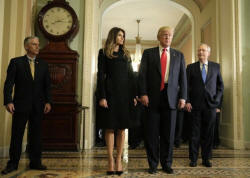|
Trump presidency could prove
a salve for pharma merger deals
 Send a link to a friend
Send a link to a friend
 [November 11, 2016]
By Carl O'Donnell [November 11, 2016]
By Carl O'Donnell
NEW
YORK (Reuters) - Biotechnology companies, whose U.S. shares soared
Wednesday after Republican Donald Trump's presidential election, may
soon see another benefit: an uptick in biotech M&A.
A potential influx of foreign cash and improved stock valuations under
the Trump administration would likely boost dealmaking in the industry,
which has been anemic ever since political rhetoric against high drug
prices picked up late last year, industry analysts and investment
bankers said.
That could mean renewed interest in some prime targets of takeover
speculation, from cancer drug specialists like Tesaro Inc <TSRO.O> to
rare diseases firms like Sarepta Therapeutics Inc <SRPT.O>, according to
several healthcare investors interviewed by Reuters.
It could also throw a lifeline to smaller biotech firms, which on
average have only 11 months of cash left to finance their research,
according to Thomson Reuters data, and have been hesitant to try to
raise money during a weak equities market.
Despite a few headline-grabbing deals, such as Pfizer Inc's $14 billion
acquisition of cancer drugmaker Medivation Inc in August, overall life
sciences dealmaking is down 65 percent from the same period last year,
according to Thomson Reuters data.
Indeed, the biggest mergers and acquisitions news this year was Pfizer's
failed bid to buy Allergan Inc <AGN.N> for $160 billion, which was shot
down by U.S. regulators in April.

Investment bankers attribute the slowdown to weak biotech stock prices,
which have traded down as much as 30 percent after Democratic
presidential candidate Hillary Clinton vowed to act against
pharmaceutical "price gouging" late last year.
Sector stocks are still valued more than 25 percent below their 2015
peak, and potential acquisition targets have stood firm against suitors
who tried to take advantage of the drop.
"There's been a gap between what acquirers and shareholders are willing
to pay for a biotech company and what the company's board thinks it's
worth," said one investment banker, who asked not to be named because he
was not authorized to talk to media.
A VOCAL CRITIC
The weak M&A environment has persisted despite pharmaceutical companies'
need to expand in fast-growing areas of drug development, from oncology
to neurology, and to sell off business units that are not a good
strategic fit.
Although Trump has said that runaway drug price inflation must be
addressed, Clinton was much more vocal in calling out particular
companies, including Valeant Pharmaceuticals International and
Mylan NV for what she deemed "outrageous" price hikes.
[to top of second column] |

U.S. President-elect Donald Trump (2ndR) answers questions as his
wife Melania Trump and Senate Majority Leader Mitch McConnell (R-KY)
watch on Capitol Hill in Washington, U.S., November 10, 2016.
REUTERS/Joshua Roberts

The Nasdaq Biotech Index rallied around 9 percent on Wednesday on news
that Trump had won the election. The index rose another 1.5 percent on
Thursday.
In another potential tailwind for biotech deals, Trump has said that he
plans to work with Congress to allow U.S. companies to pay a lower tax
rate when bringing back overseas cash.
Pfizer would be one of the biggest beneficiaries, with more than $80
billion in funds overseas that Chief Executive Ian Read would like to
repatriate. Read has said that Pfizer's appetite for deals "remains
firm," and that he would consider deals of all sizes.
The pace of biotech M&A "could accelerate if changes in the tax code
support this trend by facilitating the repatriation of cash 'trapped'
overseas for bigger biopharma companies," said Adnan Butt, an analyst at
RBC Capital Markets.
It may take several months before any benefits to dealmaking are felt,
as companies and investment banks assess Trump's new policies as
president before committing to large deals.
That has not caused big pharma to shy away from dealmaking completely,
however. Pfizer is in the early stages of reviewing a potential sale or
spin off of its consumer healthcare business, which could be worth over
$14 billion, Reuters reported on Wednesday.
Meanwhile, cash-strapped Valeant is in advanced talks to sell its
gastro-intestinal business, which could be worth as much as $10 billion,
according to media reports.
Representatives for Tesaro and Sarepta Therapeutics were not immediately
available to comment.
(Reporting by Carl O'Donnell; Editing by Michele Gershberg and Andrew
Hay)
[© 2016 Thomson Reuters. All rights
reserved.] Copyright 2016 Reuters. All rights reserved. This material may not be published,
broadcast, rewritten or redistributed.
 |